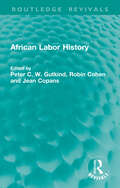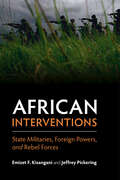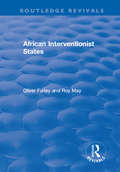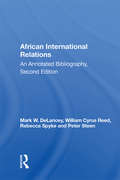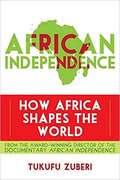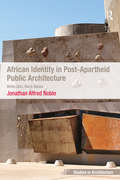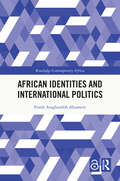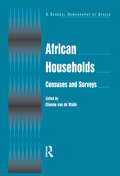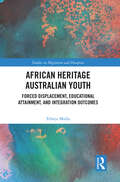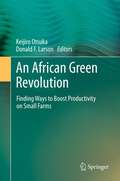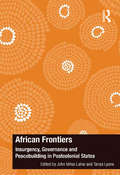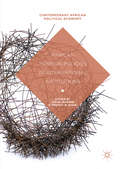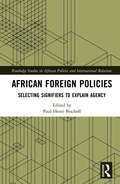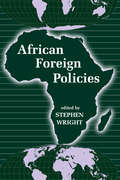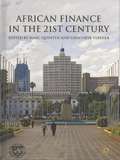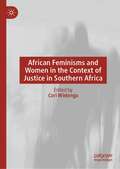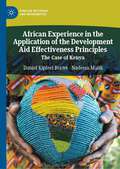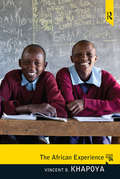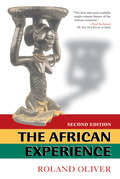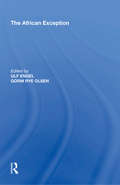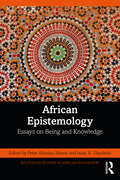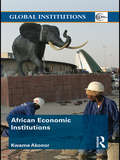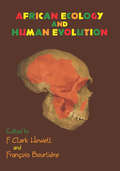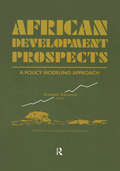- Table View
- List View
African Labor History (Routledge Revivals)
by Peter C.W. Gutkind Robin Cohen Jean CopansOriginally published in 1978, this book was distinctive in translating the work of French labour specialists and includes chapters on Nigeria, South Africa, Senegal, Kenya, Tanganyika, Madagascar and Botswana. Although all the papers are set in historically specific events, some of the larger issues receive further treatment. These concern the reality of the existence of an African working class and its class identity and consciousness. Each contributor adds to the debate by means of demonstrating how African workers have responded to their work situation, to deprivation and exploitation, and to the political authority of the colonial or neocolonial state
African Interventions: State Militaries, Foreign Powers, and Rebel Forces
by Emizet F. Kisangani Jeffrey PickeringForeign military intervention has had a profound impact on post-colonial African history and politics. Interventions have destabilized borderlands, overthrown governments, and taken a devastating toll on populations. Emizet F. Kisangani and Jeffrey Pickering advance a new theoretical framework and combine quantitative, qualitative, and historical methods to shed fresh light on these important but understudied events. Their detailed analysis brings understanding to supportive and hostile interventions and to interventions by former colonial states, non-colonial foreign actors, and African countries. Kisangani and Pickering also analyse military incursions into ungoverned territories and lands engulfed in civil war. Showcasing a variety of examples from the Second Congo War to the Ethiopian-Eritrean conflict, the book offers a rich and accessible examination of military intervention on the continent.
African Interventionist States (Routledge Revivals)
by Roy May Oliver FurleyThis title was first published in 2002: Examining the recent phenomenon in conflicts in Africa, this text addresses situations where African states and African military intervene in conflicts either in neighbouring states or beyond. While this trend has been widely observed, this is the first in-depth research that deals with such issues. It breaks new ground in identifying the key issues, actors and actions, and includes analysis of military capacities of African states and the way in which armies are used, including the increasing role of private security companies and mercenaries. The changing attitudes among members of the OAU are examined, in particular the increasing acceptance of interventionism and the blurring of boundaries. The most significant cases of intervention are examined together with less well-documented examples such as Lesotho and Guinea Bissau. This engaging account makes for a compelling resource for academics and practitioners alike.
African International Relations: An Annotated Bibliography, Second Edition (African Humanities Ser.)
by Mark W. DeLanceyAfrican International Relations is a thoroughly revised and updated bibliography that contains annotated entries for international books and journal articles in the field of African international relations.
African Independence: How Africa Shapes the World
by Tukufu ZuberiAfrican Independence highlights the important role Africa has played in recent history and the significant role it will continue to play in the future of America and the globe. In a world where much of the power and wealth remains concentrated in the hands of a very few people, this book looks at how the history of African independence has touched all people—from refugees to heads of state. <p><p> Author Tukufu Zuberi weaves exclusive interview excerpts and stories from many Africans he has met with old newsreels, current news and reports, and research into a larger narrative that takes readers through key events in African history and shows their importance today. The book provides context for understanding connections between events in Africa and the world, such as Nigeria’s Boko Haram acts of war against the citizens of Nigeria and neighboring states, China’s rise as the main superpower with the largest financial connections to the African continent, and the so-called war against terrorism. <p><p> Zuberi is also the director of the documentary African Independence, which has won awards including Best Director and Best Documentary at the San Diego Black Film Festival, Best Director at The People’s Film Festival, Best African Film at the San Diego Black Film Festival, and more. Both alone and together, the book and film offer a deeper understanding of Africa’s central role in world affairs.
African Identity in Post-Apartheid Public Architecture: White Skin, Black Masks (Ashgate Studies in Architecture)
by Jonathan Alfred NobleSince the end of Apartheid, there has been a new orientation in South African art and design, turning away from the colonial aesthetics to new types of African expression. This book examines some of the fascinating and impressive works of contemporary public architecture that 'concretise' imaginative dialogues with African landscapes, craft and indigenous traditions. Referring to Frantz Fanon's classic study of colonised subjectivity, 'Black Skin, White Masks', Noble contends that Fanon's metaphors of mask and skin are suggestive for architectural criticism, in the context of post-Apartheid public design. Taking South Africa's first democratic election of 1994 as its starting point, the book focuses on projects that were won in architectural competitions. Such competitions are conceived within ideological debates and studying them allows for an examination of the interrelationships between architecture, politics and culture. The book offers insights into these debates through interviews with key parties concerned - architects, competition jurors, politicians, council and city officials, artists and crafters, as well as people who are involved in the day-to-day life of the buildings in question.
African Identities and International Politics (Routledge Contemporary Africa)
by Frank Aragbonfoh AbumereUsing the lenses of realism, liberalism, the English School and constructivism, this book explains how the divisions and differences in African identities affect African international politics. This book explores the African condition in the twenty-first century. It analyses how geographical, racial, ethnic, linguistic, religious and power differences shape continental and intercontinental relations in Africa through the creation of identities and values which militate against intra-continental or regional relations. The author assesses inclusionary and exclusionary, rational and irrational relationships, interactions and non-interactions which occur between geographical, linguistic, racial and religious entities in Africa. He suggests that, in these moments, one entity will negatively relate, interact or refuse to interact with another entity for the gains of the former and to the detriment of the latter or even to the detriment of both entities. Divided into two parts, the first part of the book employs an ecumenical approach to discuss the divisions and differences that disunite Africa as a continent and Africans as a people and how they affect African international politics. Part II goes on to explore how this ‘othering’ can be superseded by non-discriminatory, unifying and positive identities and values. Examining the possibility of creating identities and values that can unite Africa as a continent and Africans as a people, this book will be of interest to scholars of African politics, international relations and political theory.
African Households: Censuses and Surveys
by Etienne Van WalleThis volume in the ?General Demography of Africa? series encompasses many nations and focuses on a feature of the censuses ? household relationships. African households rank among the most complex in the world. This work makes it possible to investigate relationships among individuals within the household and relate them to household characteristics such as structure and headship. In addition to discussing household composition in comparative terms, the book pays special attention to the place of women in the household, and to the residence of children and the aged. The analyses use micro-data from a variety of countries including Botswana, Burkina Faso, Cameroon, Cote d?Ivoire, the Gambia, Senegal, Kenya and the Republic of South Africa.
African Heritage Australian Youth: Forced Displacement, Educational Attainment, and Integration Outcomes (Studies in Migration and Diaspora)
by Tebeje MollaIn the last four decades, Australia has resettled thousands of African refugees. As a visibly different minoritised group, Black African youth are often represented as disengaged, dangerous, and undesirable. Even so, rarely are generative mechanisms that negatively affect the life-courses of the youth critically examined. Drawing on a wide range of theoretical resources, policy reviews, longitudinal statistical data, and in-depth interviews, this book reports on the educational attainment and integration outcomes of African heritage Australian youth from refugee backgrounds. The book also identifies intersectional factors of educational disadvantage, analyses equity provisions, and outlines policy ideas for improved educational attainment and integration of refugee youth. It is unique in its scope and focus and contributes to knowledge in African Australian studies.The book will appeal to researchers, postgraduate students, and policymakers interested in understanding the dynamics of refugee resettlement and integration.
An African Green Revolution: Finding Ways to Boost Productivity on Small Farms (Natural Resource Management and Policy #48)
by Keijiro Otsuka Donald F. LarsonThis volume explores the usefulness of the Asian model of agricultural development for Africa, where, even before the recent world food crisis, half the population lived on less than on dollar a day, and a staggering one in three people and one third of all children were undernourished. Africa has abundant natural resources; agriculture provides most of its jobs, a third of national income and a larger portion of total export earnings. However the levels of land and labor productivity rank among the worst in the world. The book explains Africa's productivity gap and proposes ways to close it, by examining recent experience in Africa and by drawing on lessons from Asia.
African Frontiers: Insurgency, Governance and Peacebuilding in Postcolonial States (The Ashgate Plus Series in International Relations and Politics)
by John Idriss Lahai Tanya LyonsThrough a multidisciplinary approach, African Frontiers counters the superficial, Eurocentric and gender insensitive dominant discursive representation of Africa within the discourse of war and conflict management, and security and peace/nation-building. The chapters historicize and theorize the realities in postcolonial African states, and the ramifications on the continents future. Situating the study within the context of the prevailing cultural and geo-political realities in the postcolonial African states, the chapters illustrate the complex ways in which events and processes are experienced at the local level, and how these local realities in turn impact and shape the patterns of political and military engagement in Africa and beyond. Organized along three major themes: Insurgency, governance and peacebuilding, expert researchers from around the world contribute chapters on: Rebel and insurgent formations such as the RUF, the LRA, and Boko Haram; state governance and corruption; terrorism and counter terrorism; security and peacebuilding; focussing on the tensions and challenges facing post-conflict societies such as Sierra Leone, Rwanda, and the newest nation-state on the continent, South Sudan. This highly significant and topical study problematizes the impact of wars on African nations, as well as the epistemological framing of the local realities and fallouts of armed conflict on post-colonial states.
African Foreign Policies in International Institutions (Contemporary African Political Economy )
by Jason Warner Timothy M. ShawGenerates conversations in the fields of postcolonial international relations; political, economic, and security studies; as well as informing the fields of foreign policy analysis and the study of international organizations. <P><P>This book is the first to exclusively consider the foreign policy tendencies of African states in international institutions. As an edited volume offering empirically based perspectives from a variety of scholars, this project disabuses the notion that Africa should be considered a "niche" interest in the field of foreign policy analysis. It asserts that the actions of the continent's states collectively serve as an important heuristic by which to interrogate and understand the foreign policies of other global states, and are not simply "anomalously" extant entities whose actions should be studied only insofar as they deviate from predictions based on the experiences of Western or other non-African states.
African Foreign Policies: Selecting Signifiers to Explain Agency (Routledge Studies in African Politics and International Relations)
by Paul-Henri BischoffThis book explores, at a time when several powers have become serious players on the continent, aspects of African agency, past and present, by African writers on foreign policy, representative of geography, language and state size. In the past, African foreign policy has largely been considered within the context of reactions to the international or global “external factor”. This groundbreaking book, however, looks at how foreign policy has been crafted and used in response not just to external, but also, mainly, domestic imperatives or (theoretical) signifiers. As such, it narrates individual and changing foreign policy orientations over time—and as far back as independence—with mainly African-based scholars who present their own constructs of what is a useful theoretical narrative regarding foreign policy on the continent—how theory is adapted to local circumstance or substituted for continentally based ontologies. The book therefore contends that the African experience carries valuable import for expanding general understandings of foreign policy in general. This book will be of key interest to scholars and students of Foreign Policy Analysis, Foreign Policy Studies, African International Relations/Politics/Studies, Diplomacy and more broadly to International Relations.
African Foreign Policies
by Stephen WrightThis volume of thirteen original essays provides a timely analysis of African foreign policies in a postCold War environment where African marginalization from the global economy appears to be increasing. Four thematic essays give an overview of critical changes occurring in African foreign policies, and ten country-by-country case studies provide specific analyses of decision-making, intraregional relations, and the struggles over policy with external agencies, including the World Bank and the International Monetary Fund. African Foreign Policies offers explanations for how African states are adapting to the international challenges of the late twentieth century. }Providing a timely analysis of the foreign policies of African states, this volume of original essays enables the reader to assess the position of African states within an evolving postCold War environment and to judge the extent of African marginalization from the global economy. As national foreign policies are increasingly influenced by factors such as regional organizations, democratization, external agencies like the World Bank and the International Monetary Fund, and the apparent weakening of state structures, there is need for fresh analysis of African foreign policies.The thirteen essays in this book, written by African, European, and North American scholars, provide comprehensive assessments of these issues in both analytical and prescriptive fashion. Three essays are thematic, considering broad areas of policy and change at the regional and continental levels; the other ten essays provide country-by-country case studies, drawing from a broad cross-section of countries in sub-Saharan Africa. Each essay analyzes factors such as decisionmaking, intraregional policies, and foreign policies toward non-African agents, including international financial institutions, and considers distinctions between formal and actual policies. As a whole, the volume seeks to explain how African countries foreign policies are adapting to new internal and international challenges in the fluid environment of the late twentieth century. }
African Finance in the 21st Century
by Marc Quintyn Geneviève VerdierWith contributions by experts from official agencies in Africa, international financial institutions, the private sector, and academia, this book focuses on financial sector development in Sub-Saharan Africa and how institutions can play a more active role in economic development.
African Feminisms and Women in the Context of Justice in Southern Africa
by Cori WielengaThis book explores justice ‘on the ground’ in Southern African communities, and in particular the roles that women play in these processes. Justice on the ground is often critiqued for being male-dominated and patriarchal. This volume seeks to unpack and problematize this assumption through the case studies of Namibia, Zimbabwe, Mozambique and South Africa. Contributions focus on the lived experiences of women and the intersections of race, class, culture and the colonial experience that shape their lives. In the rural and peri-urban contexts discussed in this book, justice on the ground is found to be relational. The network of relationships between people and the well-being and health of a community as an integral whole continue to be of central importance as the survival of the community depends on the entire community functioning interdependently. An engagement with African feminisms is helpful in providing a number of lenses, or simply questions, through which to read the case studies. These case studies reveal the complex and organic ways in which women have power and influence in relation to justice on the ground which may not be immediately obvious.
African Experience in the Application of the Development Aid Effectiveness Principles: The Case of Kenya (African Histories and Modernities)
by Daniel Kipleel Borter Nadeem MalikThis book analyses the diffusion and implementation of Aid Effectiveness Principles in Kenya’s agricultural sector. Although Aid Effectiveness Principles represent a significant step in aid and development discourse, studies on its implementation remain inadequate, especially in the African context. This book combines the perspectives of the Kenyan government, donor representatives and small-scale farmers. The discussion on Kenya brings in comparative perspectives and, therefore, would have broader relevance to the African region, in general. It highlights a disconnect between the government and farmers concerning the ownership concept, where farmers lack a voice in important policy matters. The book shows that donors have exploited the weaknesses in government responses to interpret The Principles in ways that suit their strategic interests. Consequently, the book argues that the diffusion of Aid Effectiveness Principles has taken the form of symbolic imitation – a form of policy diffusion where the policymakers choose policies for their symbolic value rather than their effectiveness.
The African Experience
by Vincent KhapoyaUpdated in its 4th edition, The African Experience is the only interdisciplinary survey to examine this region of the world from geographic, linguistic, social, historical, and political perspectives. Drawing on research from all of the social sciences, this text captures Africa in its complex totality. The African Experience helps readers develop a comprehensive and critical understanding of Africa, one that allows them to grasp the regions internal dynamics and its evolving place in the world.
The African Experience: From Olduvai Gorge To The 21st Century (History Of Civilization Ser.)
by Roland OliverThis masterpiece of scholarship and compression, the second edition of The African Experience, covers the entire span of human history across the African continent, from the earliest emergence of hominids in eastern and southern Africa up to the present day. Drawing on more than forty years of teaching and research, Professor Oliver arranges the book thematically, beginning with the human colonization of the different regions of Africa, the origins of food production, and the formation of African languages.The achievements of Ancient Egypt are placed in context with the developments in the rest of the continent, and the spread of Judaism, Christianity, and Islam - "peoples of the book." The tradition of urban settlement is traced, especially in western Africa, as well as the emergence of large and complex societies formed by the interaction of pastoralists and cultivators in eastern and southern Africa.The extent and nature of slavery in Africa is fully discussed, together with the external slave trade and the caravan trade in precolonial times. This leads to an analysis of the strengths and weaknesses of African political systems and why, from the early nineteenth century onwards, these systems were unable to withstand political pressure from abroad and the ensuing colonization. The colonial partition of Africa saw the rapid amalgamation of small units, through which considerable modernization was achieved at the expense of the indigenous structures and through the exploitation of the African peoples. Later chapters describe the birth of modern African nation-states, at a time of widespread belief in state planning - now being questioned as the political elites of black Africa begin to review their single-party systems. This new edition sees a number of revisions, including a new chapter on the 1990s, when the end of the Cold War left Africa free at last to try to solve its own problems.
The African Exception (Contemporary Perspectives On Developing Societies Ser.)
by Ulf EngelGovernance has become an important concept in the politics of African development. It is therefore a crucial concept for social science analyses focusing on Africa. In public discourse Africa's future is being shaped by a combination of external interventions backed by African elites who cooperate with the donors, whose understanding of the importance of 'good governance' they share. This groundbreaking book disentangles the analytical aspects of governance from its political and normative connotations. The 'African exception' - the difference in 'development' between Africa and other regions of the South - can be understood by analysis focusing upon the specific forms of governance played out in politics and economics. The perspective of neo-patrimonialism is crucial but not sufficient here. The first section of the book explores African governance in two functional spheres: the political realm and the economic. Section two looks at new areas of governance in Africa: violent social spaces, HIV/AIDS and entrepreneurial urban governance.
African Epistemology: Essays on Being and Knowledge (Routledge Studies in African Philosophy)
by Peter Aloysius Ikhane Isaac E. UkpokoloThis book investigates how knowledge is conceived and explored within the African context. Epistemology, or the theory of knowledge, has historically been dominated by the Western approach to the discourse of knowledge. This book however shines a much-needed spotlight on knowledge systems originating within the African continent. Bringing together key voices from across the field of African philosophy, this book explores the nature of knowledge across the continent and how they are rooted in Africans’ ontological sense of being and self. At a time when moves to decolonize curricula are gaining momentum, this book shows how understanding the specific ways of knowing that form part of the every day life of the African, will play an important part in rebalancing studies of philosophy globally. Employing critical, conceptual and rigorous analyses of the nature and essence of knowledge as understood by indigenous African societies, the book ultimately asks what could pass as an African theory of knowledge. This important guide to the connections between knowledge and being, in African philosophical thought, will be an important resource for researchers and students of philosophy and African studies.
African Economies and the Politics of Permanent Crisis, 1979-1999
by Nicolas Van De WalleThis 2001 book explains why African countries have remained mired in a disastrous economic crisis since the late 1970s. It shows that dynamics internal to African state structures largely explain this failure to overcome economic difficulties rather than external pressures on these same structures as is often argued. Far from being prevented from undertaking reforms by societal interest and pressure groups, clientelism within the state elite, ideological factors and low state capacity have resulted in some limited reform, but much prevarication and manipulation of the reform process, by governments which do not really believe that reform will be effective, which often oppose reforms because they would undercut the patronage and rent-seeking practices which undergird political authority, and which lack the administrative and technical capacity to implement much reform. Over time, state decay has increased.
African Economic Institutions (Global Institutions)
by Kwame AkonorThis book analyzes how, and under what conditions, African International Economic Organizations (IEO) have evolved, and what individual and collective contributions, if any, these African IEOs have had on Africa’s socio-economic development. Providing a comprehensive and accessible overview, the book covers the continent’s main IEOs, The United Nations Economic Commission on Africa, The African Development Bank; and The New Partnership for Africa’s Development as well as the five major Regional Economic Communities, including Economic Community of West African States, and Southern African Development Community. Assessing the degree to which African IEO’s have been able to chart their own course in coming up with their development agendas and priorities rather than following the lead of Global Institutions, this book: Provides a descriptive and analytical overview of the historical and contemporary development blueprints produced for Africa Clearly examines the contribution made by African economic institutions towards development Considers whether African economic institutions are building blocks or stumbling blocks in Africa’s development Offers a detailed evaluation and critique of African IEOs Enabling the reader to reach a deeper understanding of the challenges and potentials of development on the African continent, African Economic Institutions will be of interest to all students and scholars of African politics and development studies.
African Ecology and Human Evolution
by F. Clark Howell Francois BourliereThe record of man's early evolution, though still fragmentary, is more complete on the African continent than anywhere else in the world. The ecological context of this evolution, however, has been studied intensively only in recent years. This pioneering volume draws together eminent specialists from many fields--physical anthropologists, zoologists, geologists, paleontologists, and prehistorians--who summarize here the results of their diverse research on Pleistocene environments and the cultural and biological evolution of man in Africa.This volume was sponsored by the Wenner-Gren Foundation for Anthropological Research Inc., which met at Burg Wartenstein, Austria. The editors have field experience in Africa, especially eastern and equatorial Africa. This experience is coupled with their awareness of the need to integrate results of numerous field studies bearing on the biological-behavioral evolution of higher primates with other field studies on the paleoecology and the mammalian ecology of sub-Saharan Africa.The book includes contributions on Pleistocene stratigraphy and climatic changes throughout the African continent; on the origin and evolution of the earliest man-like creatures in Africa; on the dating, distribution, and adaptation of Pleistocene hunter-gatherer peoples; and on the ecology, biology, and social behavior of African primate and human populations. The chapters reflect vividly the state of current knowledge at the time and indicate paths for future research. Over 100 maps and figures, detailed bibliographies, and a comprehensive index contribute to the importance of the volume for basic reference use.
African Development Prospects: A Policy Modelling Approach
by United Nations StaffFirst published in 1989. Routledge is an imprint of Taylor & Francis, an informa company.
